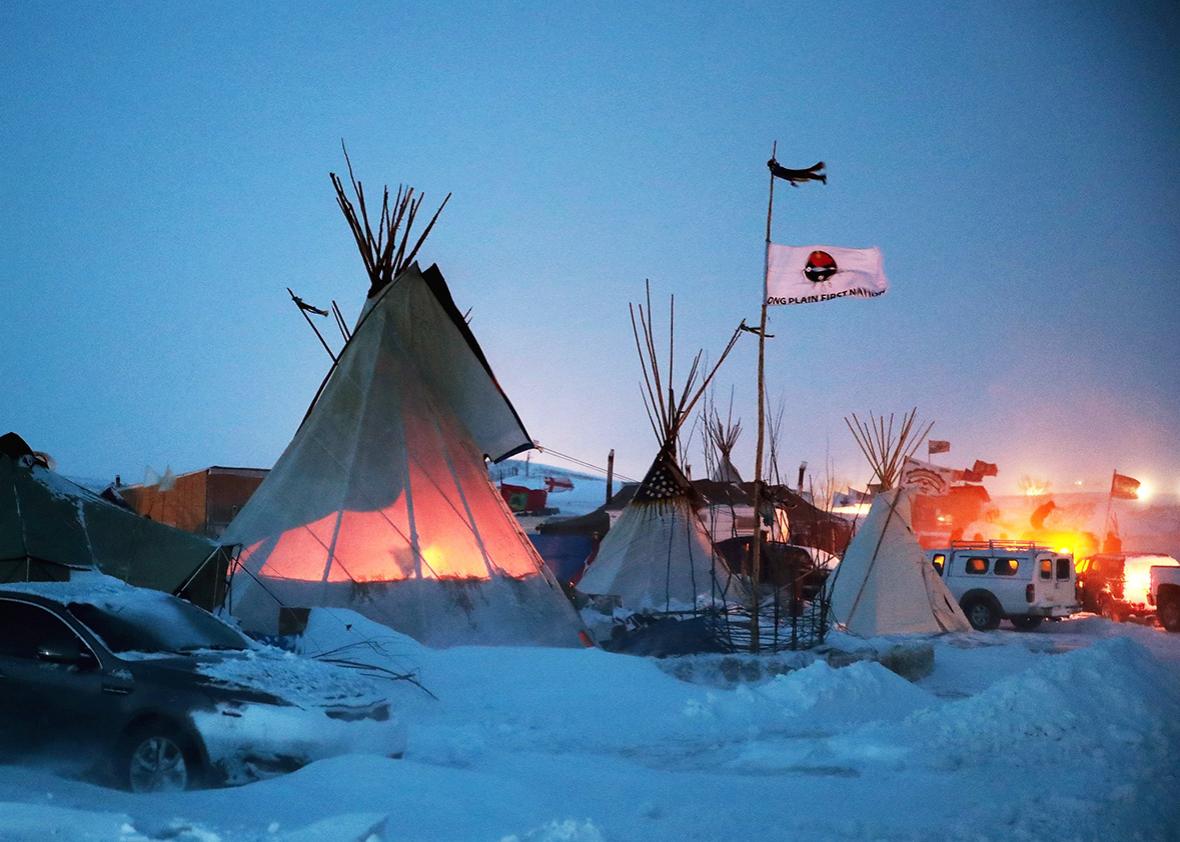This story originally appeared on the Guardian and has been reproduced here with permission through Climate Desk.
The Dakota Access Pipeline is in the final process of getting approvals to complete construction across the Missouri River, according to North Dakota Sen. John Hoeven.
The acting secretary of the Army has directed the Army Corps of Engineers to proceed with an easement necessary to finish the pipeline, Don Canton, a spokesman for Hoeven, told the Associated Press. The easement “isn’t quite issued yet, but they plan to approve it” within days, he added.
A spokesman for the U.S. Army did not immediately respond to requests for comment.
Jan Hasselman, a lawyer representing the Standing Rock Sioux tribe, cautioned in an email that the battle wasn’t over. “People are jumping the gun, no easement has been issued,” he said, adding that he had confirmed that with the Justice Department.
But Hasselman added: “I’d say it’s a near certainty that they go ahead. It will be illegal of them to do so, of course, so [we] will have to litigate that.”
The Standing Rock tribe, supported by indigenous activists and environmental groups across the globe, has long argued that the $3.8 billion project threatens sacred lands and the regional water supply.
In his first week in office, President Trump issued an executive order demanding the revival of the Dakota Access Pipeline and the controversial Keystone XL Pipeline, both of which Barack Obama had halted. The tribe vowed to fight the order, which it said is illegal and not backed by proper consultation with Standing Rock.
Though many activists left Standing Rock after the Obama administration denied the company’s permits in December, some have remained camped out by the construction site through the harsh North Dakota winter.
Obama’s decision directed the government to conduct a full environmental review of the project, known as an environmental impact statement (EIS), which is a process that the tribe has long demanded.
In a statement released on Tuesday night, the tribe said it would “vigorously pursue legal action to ensure the environmental impact statement order issued late last year is followed so the pipeline process is legal, fair and accurate”.
On Jan 18, the Army filed a notice of intent to complete the EIS for the Missouri River crossing. That process can take years and was expected to significantly delay a final decision on the permit.
“The Army Corps lacks statutory authority to simply stop the EIS and issue the easement,” the tribe said on Tuesday. “To abandon the EIS would amount to a wholly unexplained and arbitrary change based on the president’s personal views and, potentially, personal investments.”
Hoeven’s statement comes just one day after a government attorney told a federal judge that he could not provide an estimate of when the Army Corps would act on Trump’s executive order.
“The corps and the Army are continuing to make decisions under the order,” attorney Matthew Marinelli told Judge James Boasberg during a hearing on Monday, according to the Hill. Boasberg is presiding over litigation between the tribe, the pipeline company and the government.
“I can’t give you a timetable for the completion of that decision-making process,” Marinelli added.
The next court hearing is scheduled for Feb. 6. Marinelli did not immediately respond to a request for comment.
Irina Lukban, a 22-year-old activist who is at Standing Rock, said that word about the easement had not spread through camp yet on Tuesday night.
“It’s not too surprising, but it’s still really upsetting, especially with all the other tensions rising with the immigration ban,” she said, referencing Trump’s travel ban on seven Muslim-majority countries.
“We can’t give up. We can’t lose hope,” she added. “The resistance is still alive.”
Xhopakelxhit, a member of the Nuu Chah Nulth, Coast Salish, and Cree who spent months at Standing Rock, said she didn’t know if there would be enough people to try to stop the pipeline construction, since tribal leaders have urged activists to leave the camp.
But she added: “People are strong. People are firm. I don’t think people are going to stop fighting.”
Trump’s speedy effort to approve the pipeline was not surprising, she said. “It proves that America really is a giant corporation. I feel like these next four years are going to be really difficult.”
